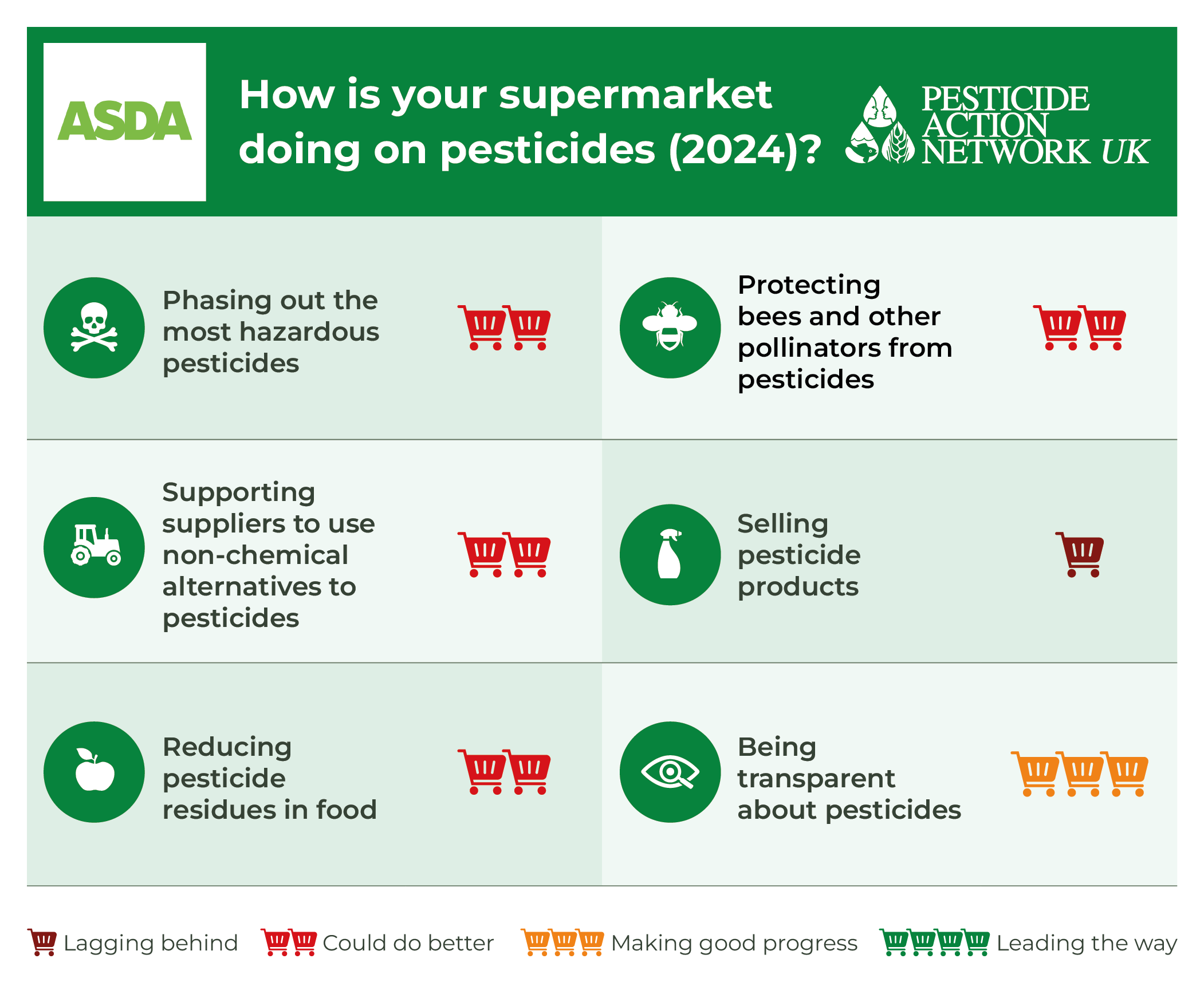Asda
Asda came seventh out of ten supermarkets in the 2024 ranking, improving its position by one spot since the previous ranking in 2021. While Asda has made a range of positive changes in the past three years, it is still doing far less than many other UK supermarkets to protect human health and the environment from pesticides.

What is Asda doing well?
Phasing out Highly Hazardous Pesticides
- Asda has a list of specific pesticides which it bans from use within its global supply chains. It also restricts the use of certain pesticides and monitors usage levels of others. The company has now expanded its lists to include many more pesticides than previously. It has also set deadlines for phasing out a number of particularly harmful chemicals such as paraquat, which can be lethal to humans, and abamectin which is highly toxic to bees.
Supporting suppliers to use non-chemical alternatives to pesticides
- Asda uses third-party sustainable farming schemes which do make some efforts to reduce pesticide-related harms to both the environment and human health. All of Asda’s UK growers are LEAF Marque certified and the company has a target to extend this to all their international growers by 2026.
- It provides bespoke support to its UK and EU growers to help them reduce pesticide use and adopt non-chemical alternatives via a range of activities, including farm visits. The company also has a communication channel aimed at all of its suppliers across the world which includes content on non-chemical alternatives. It has succeeded in phasing out the use of a number of harmful pesticides using innovative techniques. For example, it encourages its potato growers to use seed varieties that are more resistant to pests and diseases and therefore require less pesticides.
Reducing pesticide residues in food
- It tests a range of food types for pesticide residues including fruit, vegetables, herbs, spices, nuts and baby food. When this testing detects a residue that reaches two-thirds of the legal safety limit, an investigation is triggered which includes working closely with the supplier to understand and tackle the problem, and sharing any learnings across its global supply chain.
Protecting bees and other pollinators from pesticides
- The company requires that any grower wanting to use bee-toxic neonicotinoids must justify their request and seek explicit permission to go ahead. Many other pesticides classified as ‘highly toxic to bees’ also face the same restrictions, while the use of other chemicals that pose a threat to bees and other pollinators is monitored.
What are Asda’s priority areas for improvement?
Phasing out Highly Hazardous Pesticides
- In comparison to many other supermarkets, the list of pesticides which Asda bans from use within its global supply chains is fairly limited and only applies to growing fruit and vegetables. The company should expand its prohibited list to include more Highly Hazardous Pesticides and apply it to more of its products, including prepared and frozen meals and wheat products such as bread and pasta.
Protecting farmworkers from pesticides
- Asda is not doing enough to protect the health of agricultural workers using pesticides to produce food that ends up on its shelves. Unlike some other supermarkets, the company does not require agricultural workers applying particularly toxic chemicals to adopt additional safety measures. It also doesn’t monitor pesticide poisonings of workers involved in its global supply chains.
Supporting suppliers to use non-chemical alternatives to pesticides
- Asda needs to increase the support it offers to its international growers to reduce pesticide use and adopt non-chemical alternatives, including offering them bespoke advice and training (both of which they provide to UK and EU growers). Given that many of the most toxic pesticides are banned in the UK and EU, supporting international growers is particularly important.
Reducing pesticide residues in food
- Asda should expand its residue testing programme to include more food items. In particular, wheat products such as bread and pasta should be tested regularly because they often contain pesticide residues.
Protecting bees and other pollinators from pesticides
- Asda could be doing more to protect bees and pollinators. While their use is restricted or monitored, the company continues to allow neonicotinoids and other bee-toxic chemicals to be used and does not require its suppliers to monitor pollinator activity. In fact, Asda’s efforts in this area rely almost entirely on the third-party sustainable farming scheme LEAF Marque which currently only applies to its UK and EU growers.
- Pesticides are still sprayed around Asda stores and car parks with the aim of controlling weeds. While the company has confirmed that it is running trials of non-chemical alternatives (including burning, electrocution and vinegar) it has no plans to go pesticide-free, citing cost as the key barrier. To help biodiversity flourish, the company should phase out the use of pesticides around its stores as soon as possible.
Selling pesticide products
- Asda is one of just five of the top ten UK supermarkets still selling pesticides in its gardening range, including own-brand products. It offers deals and discounts on pesticides which can lead to unused pesticides being poured down the sink or put in landfill, contaminating water and soil. It also sells pet flea treatments and biocidal products (such as ant sprays or cockroach powders) both of which contain hazardous pesticides. Despite reducing its range of glyphosate-based weedkillers and stocking more natural alternatives, the company is very much lagging behind in this area and should stop selling all products containing Highly Hazardous Pesticides as soon as possible.













